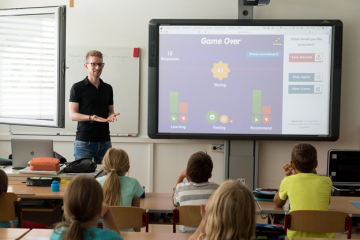 My three oldest children started the new school year last week. My daughter started high school, my son began his first year in middle school, and my younger daughter started Kindergarten. As I shooed everyone out the door that first morning praying their day would be a good one, I took a moment to take in the stillness of the house and the quiet the new school year had already beckoned into my home. I thought of all the work I’d get done while they were gone and the nap I might steal before the last bell rang. I realized that like myself, parents all over the county were secretly celebrating these little gifts that the fall had afforded them. While there’s certainly nothing wrong with counting your blessings, it occurred to me how easy it would be to simply wave goodbye to my children in the mornings and let the teachers take care of the rest. That’s what school’s for, right? Wrong! Although school is indeed back in session, our job as parents and co-educators has just begun. If you don’t believe me, just wait until your middle-schooler brings home a mountain of homework.
My three oldest children started the new school year last week. My daughter started high school, my son began his first year in middle school, and my younger daughter started Kindergarten. As I shooed everyone out the door that first morning praying their day would be a good one, I took a moment to take in the stillness of the house and the quiet the new school year had already beckoned into my home. I thought of all the work I’d get done while they were gone and the nap I might steal before the last bell rang. I realized that like myself, parents all over the county were secretly celebrating these little gifts that the fall had afforded them. While there’s certainly nothing wrong with counting your blessings, it occurred to me how easy it would be to simply wave goodbye to my children in the mornings and let the teachers take care of the rest. That’s what school’s for, right? Wrong! Although school is indeed back in session, our job as parents and co-educators has just begun. If you don’t believe me, just wait until your middle-schooler brings home a mountain of homework.
Of course, helping your kids with their homework isn’t your only parental duty. You need to keep an eye on how things are going at school (both academically and socially) to ensure that your child’s school year is a successful one. The beginning of the year is a great time to start, since your little one will be meeting new teachers and friends and encountering new, more challenging subjects. Keeping your finger on the pulse of your child’s school experience can be challenging, though. Since you can’t be in the classroom with him every day, you’ll have to employ some other strategies to make sure things at school are going smoothly. Here are a few techniques you might find helpful:
- Meet the teacher.
It’s common for parents of elementary school teachers to make an effort to get to know their child’s teacher, but as children become more independent and teachers become more plentiful, this important step is often overlooked. If for no other reason, you need to meet the teacher so that you can introduce your child. Tell the teacher what your child is like, what her talents and goals are, how she studies, what her favorite subject is, etc. If you don’t, then the teacher will have nothing to reference if your normally outgoing child suddenly becomes withdrawn for instance, or if your avid reader refuses to pick up a book in the classroom. Meeting the teacher also has countless other benefits, chief among them the simple message that you care and are there to support not only your child, but everyone involved in her education.
- Talk to your child.
When you ask how your child’s day at school went, do you really stop to listen to the details? Or are you satisfied with an obligatory “fine” as your child runs down the hall to the TV room? If you really want to know how your child is doing at school, you have to have an ongoing dialogue about the day-to-day happenings. Early Childhood News recommends practicing open communication about school in the early grades so that your child knows he can come to you if and when there’s a problem. Of course, you don’t want to interrogate your little one, but you do need to ask questions. Sometimes, simply asking your child what the best and worst parts of his day were can help you identify potential problems. If your child is reluctant, make it a game that everyone participates in around the dinner table. It doesn’t haven’t to be a serious or lengthy conversation. The goal is to stay aware of any problematic issues so that you can address them appropriately.
- Watch and Learn
Some kids just aren’t talkers, especially when it comes to school, and even when they are, conversation often doesn’t tell you the whole story. That’s why it’s important to also observe your child’s behavior. Is he happy when he wakes up in the morning, or does he drag himself out of bed? Does he invite school friends over on the weekend, or does he spend his Saturdays alone? What is his body language like when you mention school or the teacher’s name? Although none of these answers alone will bring you to an accurate conclusion regarding the nature of your child’s school experience, all of them together can give you a good indication of what’s going on.
The new school year means a lot of hard work, and not just for students. As parents, our most important job is to look after the well-being of our children—inside and outside of school. If you remain proactive and nip any potential problems in the bud before they become major crises, then you’ll be doing right by your child and ensuring that his future is a successful one—at least for another year.


